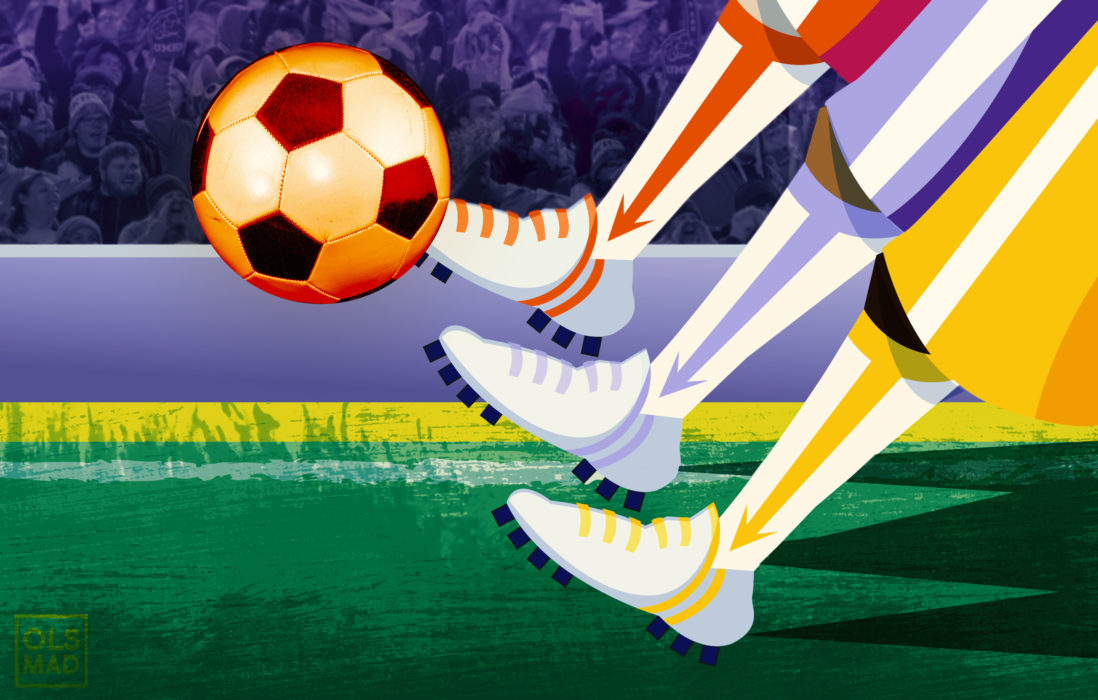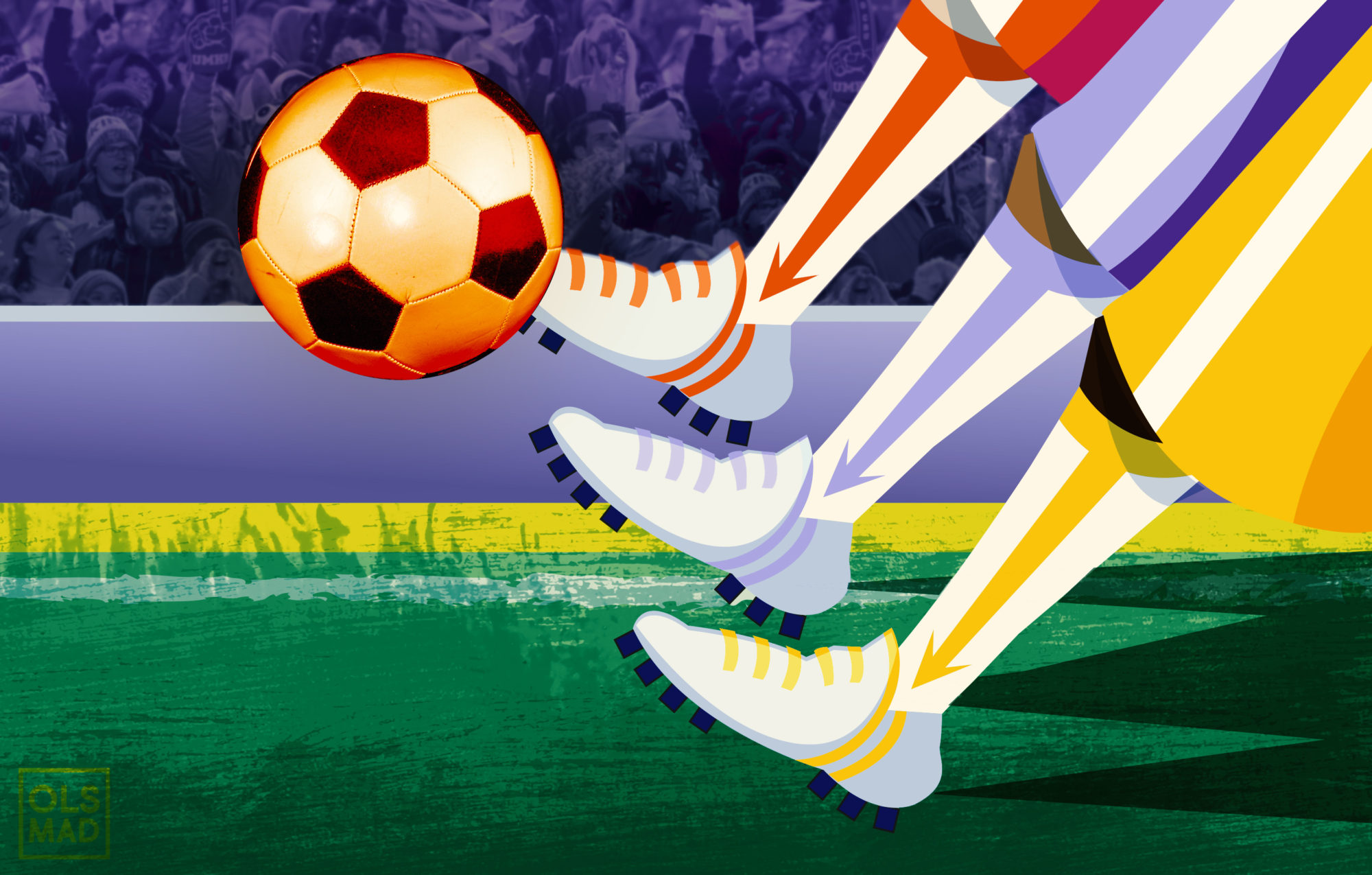
On August 23, the Major League Soccer game between the Seattle Sounders and the Portland Timbers fell eerily silent. Matches between these two teams usually feature some of the most intense chanting and taunting between supporters groups you’ll see in American soccer. This time, however, the groups were brought together in silent protest over a recent ban by MLS on banners it considers “political.” Fans in both Seattle and Portland have a history of waving a flag with a symbol known as the Iron Front — three arrows, pointing down and to the left — that was first used by an anti-Nazi organization in Germany in the 1930s. Timbers and Sounders fans wave the flag alongside rainbow pride flags and others they feel represent inclusivity. MLS said the Iron Front flag violates its rule against political banners, and banned it from league matches.
So during their August contest, neither those in the Timbers Army (Portland’s fan group) nor any of the Seattle supporter groups uttered a peep for more than a half-hour. In the 33rd minute (a nod to the year 1933, when Adolf Hitler came to power in Germany and effectively disbanded the Iron Front), Timbers and Sounders supporters alike broke into a rendition of the Italian anti-fascist ballad “Bella Ciao.”
In addition to being centers of American soccer culture, Portland and Seattle are known to some as progressive bastions; to others, they are homogeneous epicenters of whiteness. These sometimes at-odds narratives are converging in the form of a controversy between a soccer league and its most ardent fans, and the debate is playing out in a space that’s uncomfortably public for some residents.
The protests are ongoing. On September 15, the normally raucous stadium section behind the south goal at Seattle’s CenturyLink Field sat startlingly empty during the second half of the Sounders’ match against the New York Red Bulls. The Emerald City Supporters, the fan group that usually occupies those sections, walked out at halftime after one of their leaders was asked to leave for waving an Iron Front flag.
Some fans have been frustrated by the antagonism between MLS and the supporters groups. “I bring my family to the games. We do not want to go to a political rally. Go protest downtown,” one fan commented on a Timbers Army blog post. But for many in the supporter club culture in these cities, matches are opportunities for “radical inclusion,” according to Stephan Lewis, a board member of the Timbers Army and Rose City Riveters’ parent organization.
Games held at Portland’s Providence Park are a sight to behold, punctuated by what might be the country’s most rabid fan base. Fans display huge tifo banners, and participate in chants and songs orchestrated by “capos” with voices that can fill a stadium. When the Timbers score a goal, a man known as Timber Joey chainsaws off a round from an enormous Douglas fir. The league often uses images from Timbers games in marketing campaigns. To Lewis, the immense supporters group and unique atmosphere they create is thanks to their ethos that “the only thing we don’t tolerate is intolerance” in a city with a checkered past in that department.
According to Lewis, American supporters groups were taking hold around the same time that Pacific Northwest cities were facing a culture war of sorts. “In the 1980s and 1990s, there were a lot of hate groups coming into Portland, and we’re not alone in this, but they wanted to use our city as a proving ground for tactics to recruit,” Lewis said.
Mark Bray, a historian and author of Antifa: The Anti-Fascist Handbook, said there’s a reason white supremacist groups targeted Pacific Northwest cities for recruitment. “Certainly the whiteness of a city like Portland creates context where far right groups can embolden xenophobic and racist perspectives,” he said. “And then of course you have a response to that.”
That response, according to Bray, has included anti-fascist and anti-racist organizing. “The longest-known antifa group in the United States is the Rose City Antifa,” he said. Early soccer supporters culture was a natural fit for anti-fascist individuals, too.
“Back then, there were whole generations of kids who played soccer here and … you were called a ‘soccer fag’ essentially, if you did,” Lewis said. “So there was built-in empathy right off the bat, I think, for creating a safe space as supporters.”
Then, of course, there’s the fact that racism and xenophobia inside soccer stadiums is nothing new, and it continues today. On September 6, during a National Women’s Soccer League match between the Portland Thorns and the Utah Royals, a fan shouted racist slurs at Thorns goalkeeper Adrianna Franch, who is black. In February, opposing fans waved a white nationalist flag and shouted slurs at the girls soccer team from Woodburn High School, a school in Oregon’s Willamette Valley with a heavily Latinx student body.
To Lewis, waving the Iron Front flag as a symbol of anti-fascism and anti-racism is not political; rather, it signals a welcome space in a city where people have had to publicly stand up to groups that stood for fascism and racism. “There are people who are trying to make people afraid,” he said. “This isn’t just about Timbers Army … or the Riveters. This is about us as a city. … We thought we pushed this away in the ’90s, but we just pushed it into the shadows.”
Indeed, instances of white nationalist and paramilitary activity are on the upswing in Portland and throughout the West, according to Eric Ward, executive director of the Western States Center, an organization focused on social, economic, racial, and environmental justice. He cited the murder of two individuals on a Portland MAX train in May 2017 by a man threatening Muslim women, and rallies on the streets of Portland this summer in which the Proud Boys and American Guard, groups affiliated with fascist and white supremacist views, clashed with antifa counter-protesters.
Not all residents experience these threats the same way. Take the protests for example, Ward said. “What is seen as merely a nuisance to a population that is 90 percent white — an inconvenience — is completely terrifying to people of color, immigrants, Muslims, those who are LGBTQ, just to name a few,” he said. “As an African-American man who has to walk the streets of Portland every day, I feel very fearful. It’s anxiety provoking just to utilize public space, in Portland, in Vancouver, and across Oregon. That’s not a new thing … but it becomes much more frightening when coupled with these visualizations one sees on the nightly news.”
When soccer supporter clubs aim to be tightly knit with the community, as Portland’s does, this culture clash shows up during soccer games. The disconnect between the supporters groups and the MLS — plus fans who say they would rather sports and politics steer clear of one another — reflects divisions playing out in cities like Portland and Seattle where certain residents may be far more aware than others about these rising instances of racism, fascism, and hate groups. That division is exacerbated when anti-fascist speech is politicized.
“If you were to see the antifascist symbol before Trump’s presidential campaign, no one would probably know what it was — no one would care,” Bray said. “Now, it’s tied into … efforts by the right to claim that antifa is a terrorist organization, when it’s not even an organization. Presumably MLS doesn’t want to get involved in all of that. That’s not really surprising.”
Ward agrees that the politicization of anti-racism and anti-fascism is concerning. He cited threats of extreme violence, such as those from a Marine veteran in Oregon who recently detailed on a national talk-radio show his plan for murdering antifa members while they slept. In light of the escalating threats, Ward wishes more groups took a stand similar to the soccer supporters clubs. “I love Portland, Oregon. And if I could say anything, it is that communities of color don’t know where folks stand if they don’t speak up,” he said.
Representatives from several supporters groups and the MLS met in Las Vegas Thursday to discuss the matter, but no rule changes have been announced. And if MLS doesn’t change its stance? Some fervent supporters like Lewis could rethink where they spend so much of their time, energy, and capital.
“They’re risking a prosperous future, honestly,” Lewis said. “Especially a business as niche as a soccer league. To try to stifle [us] is just going to make them look bad.”

